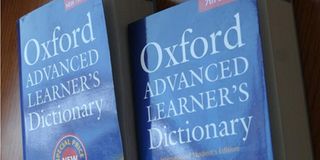'Kitu Kidogo' and 'Panya Route' added to Oxford English Dictionary

Copies of Oxford Advanced Learner's dictionary.
What you need to know:
- The latest update also features the addition of two other words—Intore and Seggae —from Rwanda, Burundi and Mauritius.
Kitu Kidogo and Panya Route and Rolexand other words from parlances in East Africa are the latest entrants into the Oxford English Dictionary.
Kitu kidogo is a Swahili word for money offered or accepted as an inducement or bribe while panya route is a secret path or roundabout route, especially one used for smuggling.
The Oxford University Press explained that Swahili is the region’s main lingua franca and had contributed a large number of loan words to East African English since 1806.
In Swahili, kitu means ‘thing, item, or matter’, while kidogo is the prefixed form of dogo, ‘small, insignificant’.
On the other hand, panya route was originally coined in Sheng – the East African street language that mixes Swahili with English.
“This loan blend combines the Swahili word panya ‘mouse’ with the English word route,” the Oxford University Press said of the word.
Rolex, a Ugandan word, is an omelette and vegetables wrapped in a chapatti, and its unusual name is a playful twist on ‘rolled eggs’.
“Say the word rolex in Uganda and the locals will be more likely to think not of a fancy watch, but of a delicious street food staple,” explained Oxford University Press.
The new addition adds to hundreds of other words that Oxford has adopted from East Africa. Other recent additions are nyama choma, asante sana, jembe, sambaza, mpango wa kando, chapo, uhuru, githeri, chang'aa, busaa, come-we-stay, jembe, buibui, sambaza, sheng, muratina, kamba, sufuria, merry-go-round, isukuti, jiko, mandazi, mabati, among others.
The latest update also features the addition of two other words—Intore and Seggae —from Rwanda, Burundi and Mauritius.
Intore signifies a traditional war-themed dance of Rwanda and Burundi, which is accompanied by drumming and is typically performed by male dancers at festivals, weddings, and other special occasions.
Then there is Seggae which is a blend of the words sega and regga, that “is a style of popular music originating in Mauritius, combining the strong, syncopated beats, percussion instruments, and Creole lyrics of sega and the strongly accentuated offbeat and prominent bass line of reggae,” said Oxford Languages.
The Oxford English Dictionary considers inclusion of word in its pages after gathering independent examples from a good variety of sources, and evidence that the word has been in use for a reasonable amount of time.
“All Oxford Languages content is uniquely curated and delivered by our expert team of lexicographers, linguists, and language technologists to the highest of standards. We bring this unparalleled expertise to partnerships across the globe as we work with like-minded innovators to advance learning and communication for future generations,” OED added.
The Oxford English Dictionary is widely regarded as the accepted authority on the English language. It is an unsurpassed guide to the meaning, history, and pronunciation of 600,000 words – past and present – from across the English-speaking world.
As a historical dictionary, the Oxford English Dictionary is very different from dictionaries of current English, in which the focus is on present-day meanings.
One can still find present-day meanings in the Oxford English Dictionary, but also find the history of individual words and of the language – traced through 3 million quotations, from classic literature and specialist periodicals to film scripts and cookery books.




